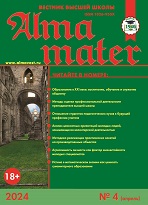UDC 378
https://doi.org/10.20339/AM.12-21.014
V.P. Soloviev is Cand. Sci (Technic), Prof. at NUST MISIS, e-mail: solovjev@mail.ru ; and T.A. Pereskokova is Cand. Sci. (Pedagogy), Ass. Prof. at Institute — Brunch of RGGRU (MGRI) in Stary Oskol
This study examined the problem of the relationship between teachers and students, which has become a key to success in the educational process. Shown is the importance of using the results of a survey of students about their satisfaction with the organization and implementation of the educational process, the level of professional and pedagogical skills and personal qualities of teachers.
The transition to a classroom interactive learning system is recommended, which facilitates the use of innovative educational technologies such as problem-based learning, modular learning, blended learning. Recommendations are made for some systemic changes in vocational education to produce people who are well prepared for modern life.
Key words: teachers, students, competencies, questionnaire, teacher’s class, student-centered principle, education.
References
1. Bezpalova, A.G. Assessing Competencies of Academic Staff in University from Point of View of Students: Local Aspect. Alma mater (Vestnik vysshei shkoly). 2021. No. 8. P. 66–71. DOI: 10.20339/AM.08-21.066
2. Pereskokova, T.A., Soloviev, V.P. On the formation of personal (professional) dignity of graduates of higher education organizations. Alma mater (Vestnik vysshei shkoly). 2017. No. 12. P. 15–20. DOI: 10.20339/AM.12-17.015
3. Soloviev, V.P., Pereskokova, T.A. Vocational education: problems of the quality of training specialists. Alma mater (Vestnik vysshei shkoly). 2019. No. 3. P. 47–53. DOI: 10.20339/AM.03-19.047
4. Pereskokova, T.A., Soloviev, V.P. Assessment of the conformity of personal qualities of students of the chosen profession. Russian Journal of industrial Economics. 2015. No. 3. P. 88–94.
5. Soloviev, V.P., Pereskokova, T.A. Formation of social and personal qualities of an engineer. Engineering education. 2019. No. 25. P. 119–129.
6. Pshennikov, V.V. Japanese management. Lessons for us. Moscow: Japan today, 2000. 334 p.
7. Liker, D., Mayer, J. Talented employees: Education and training of people in the spirit of the Toyota tao. Moscow: Publishing group “Tochka”, 2019. 294 p.
8. Ishikawa, K. Japanese methods of quality management. Economy. 1988. 215 p.
9. URL: http://newprospect.ru
10. Soloviev, V.P., Kochetov, A.I., Krupin, Yu.A., Pereskokova, T.A. Quality is the calling card of our time. Moscow: Universitetskaya kniga, 2016. 181 p.
11. Zimnaya, I.A. Key competencies as the effective — target basis of the competence approach in education. Moscow: Issledovatelskii tsentr, 2004. 38 p.
12. Pereskokova, T.A., Soloviev, V.P. From the pedagogy of “learning” to the pedagogy of “possibilities”. Alma mater (Vestnik vysshei shkoly). 2019. No. 9. P. 18–26. DOI: 10.20339/AM.09-19.018
14. Nemov, R.S. Psychology. Moscow: Yurayt, 2010. 639 p.
14. Zimnaya, I.A. Pedagogical psychology. Moscow: Logos, 2000. 383 p.
15. Castells, M. The Information age: economy, society and culture. Moscow: Higher School of Economics, 2000. 449 p.
16. Adler, Yu.P., Shper, V.L. Education in the XXI century: problems, prospects, solutions. Quality and life. 2015. No. 4. P. 37–45.











.png)






